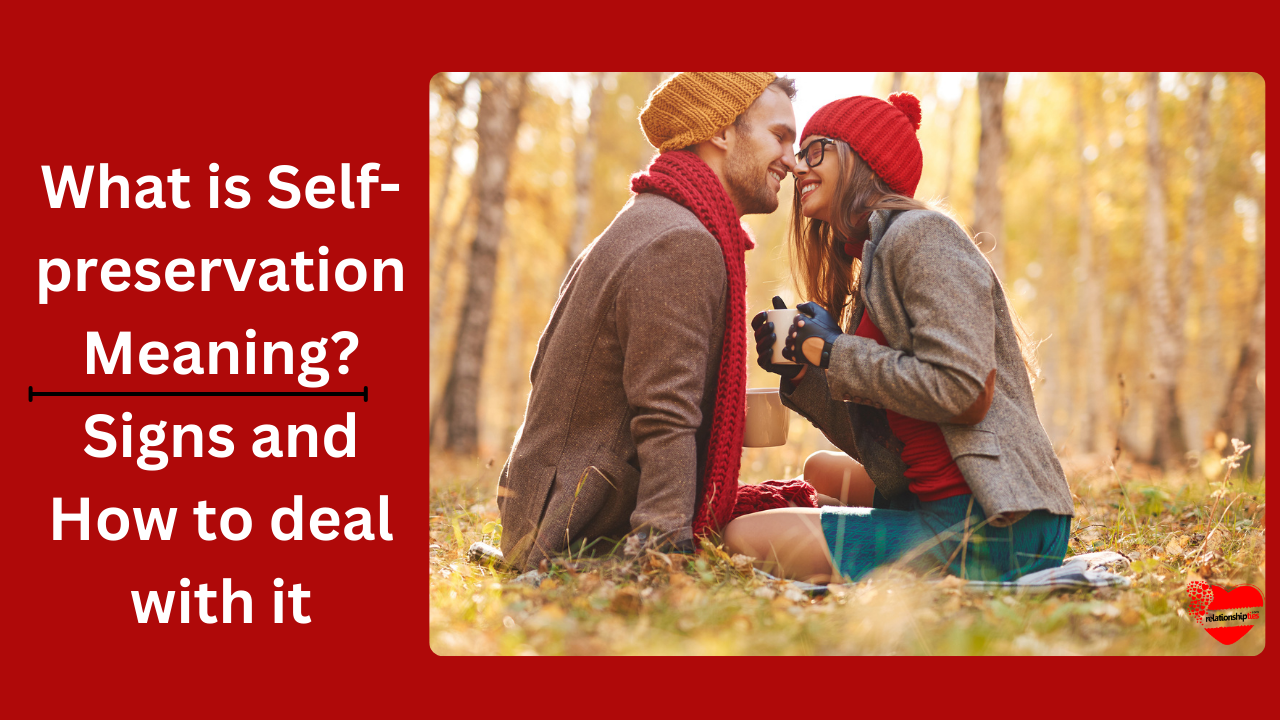What Is Self-Worth Meaning? How Do I Build Self-worth in a Relationship?
What if I told you that building happy and healthy relationships is mostly dependent on your feeling of self-worth?
Navigating the complex terrain of human connections requires an understanding of the genuine meaning of self-worth, which can be transformed through learning how to build it inside a relationship.
We will explore the depths of self-worth in this article, as well as its importance for personal development and how it affects our relationships with others.
Along the way, we’ll unearth useful techniques for establishing and preserving self-worth in the context of a relationship, giving you priceless knowledge for promoting emotional health, mutual respect, and trust.
Table of contents
- What is Self-worth?
- What Does Self-Worth in a Relationship Mean?
- What are the Benefits of Self-Worth in a Relationship?
- How to Increase Your Self-Worth in a Partnership
- 1. Take Care of Yourself
- 2. Establish Boundaries
- 3. Exercise Self-Compassion
- 4. Adorn Yourself with Positive Encounters
- 5. Honour accomplishments:
- 6. Develop Your Self-Reflection
- 7. Dispute Your Negative Self Talk
- 8. Talk with assertiveness
- 9. Set values as a priority
- 10. Exercise Gratitude
- 11. Take Lessons from the Past
- 12. Seek Expert Assistance
- 13. Develop Your Self-Acceptance:
- 14. Encouragement Statements:
- 15. Take Responsibility for Your Happiness
- Ways to Feel Appreciated in Your Relationship
- FAQs
- Conclusion
- Related Articles
What is Self-worth?
In its most basic definition, self-worth is the value we place on ourselves, or our perceived value. It centres on your realization that their worth and significance are independent of things like accomplishments, wealth, looks, and approval from others or a person.
In a larger sense, self-worth is an internal force that influences how you manage relationships, job advancement, and emotional welfare.
It transcends physical existence. It affects the perspective you have on the story of your life; those with strong self-esteem might view setbacks as chances for growth and learning, as opposed to failures.
Having self-worth enables us to see that, regardless of our achievements or shortcomings, we are still valuable people deserving of respect and affection.
What Does Self-Worth in a Relationship Mean?
In a relationship, self-worth is more than only considering one’s worth from the viewpoint of one’s spouse.
It penetrates deeper levels, representing a person’s innate understanding and acceptance of their individuality, capabilities, and limitations.
From this vantage point, it is clear that self-worth functions as an internal compass, directing us in establishing healthy boundaries that honour our values and personal space in addition to determining how we allow others to treat us.
Despite what some people may believe, having a strong feeling of self-worth in a relationship frequently strengthens rather than weakens love.
Individuals who have a high sense of self-worth recognize their value and are therefore less inclined to put up with harmful habits or behaviours.
They also feel worthy of respect, kindness, and true love. They shed light on genuine confidence, which is a captivating quality that encourages respect from partners and provides compelling role models for valuing oneself independently of outside approval.
The degree of self-worth that each person possesses is one of the most significant variables that contribute to the success of relationships.
The value and regard you have for yourself is known as self-worth, and it is fundamental to how you view and manage your interpersonal interactions.
Read Also: Personal Development | Building Your Life
What are the Benefits of Self-Worth in a Relationship?
Self-worth is vital to the success and general well-being of any relationship, romantic, family, or platonic. The value and significance we accord ourselves as unique individuals is referred to as self-worth.
Our relationships with others, especially our spouses, are positively impacted when we possess a sound sense of self-worth.
Enhanced Self-Assurance
Confidence is increased when we feel good about ourselves. We are more inclined to speak up for ourselves, communicate our needs and wants, and establish appropriate limits when we have confidence in our worth.
With our partner, we can speak more effectively and build mutual respect and understanding thanks to our confidence.
Enhanced Interaction
We are better able to communicate honestly and freely when we feel good about ourselves. We are more inclined to express our emotions, ideas, and worries civilly and helpfully.
The emotional bond between partners is strengthened and trust is fostered by this free conversation.
Adaptability
Our sense of self-worth gives us the fortitude required to weather the ups and downs of a relationship. It enables us to overcome disagreements, obstacles, and disappointments.
Strong self-worth makes it less difficult for us to internalize bad situations and more likely for us to see them as teaching moments.
Wholesome limits
Having self-worth gives us the ability to set and uphold appropriate limits in our relationships. Our ability to identify and express our boundaries has improved, allowing us to make sure that our needs are satisfied and that our well-being comes first.
In a relationship, healthy boundaries foster a sense of comfort and safety that supports a harmonious and mutually satisfying dynamic.
Respect for One Another
Respect is fostered in a relationship when both partners have a sound sense of their value. Every person is aware of and respects both their own and their partner’s worth. A happy relationship where both sides feel seen, heard, and valued is built on this mutual respect.
Read Also: How To Build A Dynamic Relationship: Meaning and Their Types
Self-reliance
Within a relationship, independence is fostered by self-worth. When we feel good about ourselves, we don’t need our partner to make us feel validated or fulfilled.
We can continue to be ourselves, follow our interests, and live separate lives from the partnership. The partnership’s longevity and general health are improved by this independence.
Mental Health
Our emotional health and sense of self-worth are strongly related. We are more likely to feel happier, more fulfilled, and more satisfied in our relationships when we have a positive self-image and believe in our values.
Our mental health has a beneficial effect on the relationship, fostering an atmosphere that is supportive and nurturing to both parties.
Development and Personal Progress
A strong sense of self-worth promotes relationship development on a personal level. We are driven to keep becoming better and becoming the finest versions of ourselves when we value who we are.
Not only does this development help each of us personally, but it also advances the partnership overall.
Read Also: 3 Harsh Facts About Long-distance Relationship
How to Increase Your Self-Worth in a Partnership
1. Take Care of Yourself
Making self-care a priority is investing time and effort into pursuits that enhance your mental, emotional, and physical health.
Exercise, meditation, hobbies, or any other activity that makes you happy and calms you down demonstrates how important it is to take care of your general health.
By supporting a good self-image and a sense of self-worth in both yourself and your relationship, this practice serves to reaffirm the notion that your well-being counts.
2. Establish Boundaries
Setting up limits lets your partner know how important you are to your wants and well-being. These boundaries serve as instructions to guarantee that your mental and emotional well-being is respected and safeguarded in the partnership.
By articulating and maintaining these boundaries, you show that you value yourself, which promotes a positive dynamic and mutual respect.
3. Exercise Self-Compassion
Practising kindness, understanding, and forgiveness toward oneself is a necessary part of embracing self-compassion.
You can develop a better relationship with yourself if you treat yourself with the same compassion and understanding as you would a loved one.
By strengthening resilience and fostering a good self-image, this practice helps people respond more empathetically and gracefully to difficult circumstances in their relationships.
4. Adorn Yourself with Positive Encounters
Being part of a positive social circle, mentors, or encouraging pals helps you feel good about yourself.
Encouragement and reinforcement from positive people might help you feel more confident and self-assured.
Being in a supportive atmosphere improves self-worth, self-growth, confidence, and general well-being. It also has a good effect on relationship dynamics.
Read Also: Friends with Benefits Meaning in Relationship| Is it Right for Me
5. Honour accomplishments:
It’s important to take the time to recognize and celebrate even the little victories. You boost your self-esteem by acknowledging your accomplishments.
It’s a means of fostering a good self-image and bolstering your feeling of self-worth by recognizing your accomplishments, validating your efforts, and honouring your talents.
6. Develop Your Self-Reflection
Reflecting on yourself entails looking at your ideas, emotions, and actions. It’s an introspection tool that helps you identify the causes of your poor self-perceptions.
Gaining an understanding of your feelings, behaviours, and patterns via self-reflection promotes personal development and helps you change any negative ideas or habits.
7. Dispute Your Negative Self Talk
Using positive affirmations to counter self-criticism is an effective strategy.
By deliberately substituting positive statements with negative ones when they occur, you can refocus your attention on your values and strengths.
This technique helps you develop a more positive self-image and increases your sense of worth by gradually changing your mentality.
8. Talk with assertiveness
It’s critical to clearly and respectfully communicate your needs. Healthy relationships are built on effective communication.
Respect and understanding between partners are fostered by assertively expressing your demands and boundaries.
It creates a structure for constructive communication, guaranteeing that your requirements are understood and met in a courteous and encouraging environment.
9. Set values as a priority
Living a conscious life in line with your beliefs is the first step towards ensuring that your activities are in line with your basic values.
Your sense of authenticity and integrity is strengthened when your behaviour is consistent with your principles.
This harmony gives your relationships meaning and purpose while reaffirming that your actions and choices are consistent with what matters most to you. It also boosts your sense of self-worth.
10. Exercise Gratitude
Recognizing and valuing the good things in your life is a necessary step in developing an attitude of appreciation.
Changing your attention from self-doubt to appreciating life’s gifts strengthens your sense of value.
Whether for relationships, experiences, or personal development, expressing thankfulness fosters a more positive self-view and increases sentiments of self-worth.
11. Take Lessons from the Past
By thinking back on previous relationships, you can gain understanding and spot areas for improvement.
Acknowledging unhealthy habits or actions from previous relationships gives you the power to choose better options for your current relationship.
Gaining knowledge from these experiences advances one’s personal growth and strengthens one’s sense of value in interpersonal interactions.
12. Seek Expert Assistance
If your self-worth is greatly impacted by past experiences, consulting a therapist or other expert can be quite helpful.
Therapy provides a safe space to talk about and recover from prior traumas or unfavourable events that could be impairing your self-worth.
The advice of a professional helps in navigating and conquering obstacles, promoting a more robust and positive feeling of self-worth.
13. Develop Your Self-Acceptance:
Adopting self-acceptance entails accepting and appreciating your actual self, with all of its flaws and defects. It’s about accepting who you are and realizing that no one is flawless.
To maintain a strong feeling of self-worth and a healthy self-image in both yourself and your relationships, self-acceptance is essential.
14. Encouragement Statements:
Consciously exposing yourself to messages that uphold your positivity and sense of worth is the first step in surrounding yourself with positive affirmations.
These affirmations could be short phrases or sentences that reaffirm your values, talents, and qualities. A more positive self-image and a stronger sense of self-worth are fostered by consistently repeating or supporting these positive thoughts.
15. Take Responsibility for Your Happiness
Realizing that happiness and self-worth are something you can manage is the first step toward taking charge of them.
It entails deliberately setting aside time for pursuits, connections, and decisions that enhance your well-being.
You take control of creating a happier and more contented life for yourself by deliberately investing in the things that make you happy, fulfilled, and confident in your abilities.
Read Also: Just a Friend: 21 Telltale Signs a Relationship Feels Like Friendship
Ways to Feel Appreciated in Your Relationship
It takes work on both sides to create a happy and healthy relationship. Sustaining a healthy relationship requires feeling respected and liked by your spouse.
Strong and enduring bonds are facilitated by a sense of significance and worth experienced when one is cherished. The following crucial actions will make you feel appreciated in a relationship:
Express Your Needs
Any healthy relationship starts with open and honest communication. Make sure your partner knows exactly what you need and expect from them.
Tell them what gives you a sense of worth and appreciation. Keep in mind that your spouse cannot read your mind, so you must express your desires clearly.
For instance, if you value deeds of service, tell your partner how little things like preparing a meal or assisting with housework make you feel important.
You give your spouse the chance to comprehend and accommodate your requirements when you communicate them.
Express gratitude
Your partner wants to be appreciated just as much as you do. Give your companion some thought and acknowledge the things they do for you.
Express gratitude for their efforts, whether it’s a small gesture or a big donation. Saying “thank you” or sending a kind letter are small but effective ways to show your partner how much you appreciate them.
By expressing gratitude, you foster a supportive and encouraging atmosphere that motivates both partners to keep trying to be appreciated in the relationship.
Engage in Active Listening
In any relationship, listening is a vital ability. Whenever your spouse speaks, focus entirely on them.
Refrain from interrupting or discounting their emotions and opinions. Rephrase what they’ve said and consider what they’ve said to demonstrate active listening.
By paying attention to what your partner has to say, you show that you respect their thoughts and feelings.
This promotes open communication and a sense of trust. Both parties are more likely to feel appreciated in the relationship when they are heard and understood.
Boost each other’s objectives
In a relationship, being valued entails encouraging each other’s goals and objectives. Be your partner’s strongest supporter and encourage them to pursue their objectives.
Take a sincere interest in their interests and give them the encouragement they need to achieve.
A sense of cooperation and partnership is established when you support one another’s objectives. This helps both of you grow as individuals and enhances the link between you. Your partner will value and appreciate you more if you feel encouraged in your pursuits.
Have Respect for One Another
A vital component of any happy relationship is respect. Show your partner respect, thoughtfulness, and sensitivity. Steer clear of insulting or degrading conduct, as this can undermine the foundation of respect and trust.
Feeling appreciated in a relationship requires that both partners respect each other’s limits, viewpoints, and choices. Respect between couples fosters a secure and supportive environment in which each party can flourish.
Make quality time a priority.
It’s simple to become overwhelmed by life’s busy schedule in the fast-paced world of today. Prioritizing quality time with your partner is crucial, though. Allocate a specific time to strengthen your relationships with one another.
Take part in things that you both enjoy doing, like taking a stroll, cooking together, or just spending quality time together talking.
You can create a sense of value and importance in your relationship by showing your partner that you love and care for them by spending quality time together.
Read Also: What is Sibling Sexual Abuse? | Facts, Signs, and Effects
FAQs
Self-worth refers to the value and respect you place on yourself as an individual.
Building self-worth in a relationship involves open communication, setting boundaries, and practicing self-care.
Self-worth is important in personal development as it helps individuals set healthy boundaries and make positive choices for themselves.
Signs of low self-worth include seeking validation from others, feeling unworthy or inadequate, and difficulty asserting personal needs.
Yes, self-worth can be improved through therapy, self-reflection, and practicing self-compassion.
Conclusion
Self-worth is the intrinsic value and respect that an individual has for themselves. Building self-worth in a relationship involves recognizing one’s strengths and weaknesses, setting boundaries, and fostering open communication with their partner.
It also entails understanding that one’s worth is not determined by external validation or the opinions of others. By prioritizing self-care and seeking support when needed, individuals can cultivate a strong sense of self-worth within their relationships.




